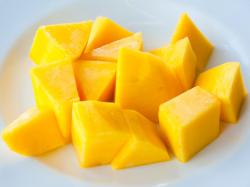National Mango Board To Host Mango Food Safety Conference
February 8, 2013 | 2 min to read

Orlando, Fla. – The National Mango Board (NMB) will be hosting their inaugural Mango Food Safety Conference on Wednesday, Mar. 6, 2013, from 7:30 a.m. to 3:30 p.m. at the McAllen Convention Center at 700 Convention Center Blvd., McAllen, TX. This conference is a free information sharing event and industry members of all levels of the mango supply chain are encouraged to join.
Keynote speakers will provide attendees with information about food safety guidelines and standards, high risk areas and suggested solutions for the mango industry, a broader view of the field, how food safety issues affect the food supply chain, and much more. “This conference provides an opportunity for mango industry members to learn and network, all while gaining useful and applicable tools and resources to help protect the health and safety of consumers,” said NMB Executive Director William Watson.
The following keynote topics will be discussed during the Mango Food Safety Conference:
- Food Safety Areas of Opportunity in the Mango Industry
- Food Safety Guideline Certifications
- When a Crisis Hits Home
- How Food Safety Issues Affect Commerce
- U.S. Government and Food Safety
- Tools and Solutions to Help Reduce the Risk of Food Safety Issues
Opportunities to sponsor this conference are also available, as this event will provide a platform to showcase companies to a highly targeted audience of approximately 150 producers, handlers, suppliers, distributers, importers, marketers and researchers that provide fresh mangos to the U.S. marketplace. Current sponsors of the Mango Food Safety Conference include GM Produce Sales.
For more information about the conference please visit www.mango.org/mango-food-safety-conference. For sponsorship opportunities, contact Melanie Teel at mteel@mango.org or 407-629-7318 ext. 103.
About National Mango Board
The National Mango Board is a national promotion and research organization, which is supported by assessments from both domestic and imported mangos. The board was designed to drive awareness and consumption of fresh mangos in the U.S. One cup of mango is only 100 calories, an excellent source of vitamins A and C, a good source of fiber and an amazing source of tropical flavor.
Mango availability per capita has increased 35 percent since 2005 to an estimated 2.53 pounds per year in 2011. Mango import volume for 2011 was 810 million pounds. Learn more at www.mango.org.
Source: National Mango Board
